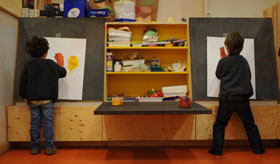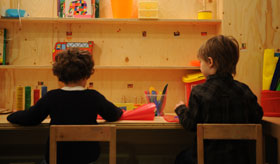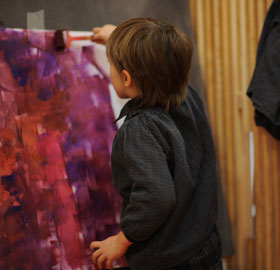Teaching Philosophy
A.P.E is not affiliated to any one particular pedagogic approach, but instead brings together several methods, notably those described as 'alternative', and relying particularly on certain tools created by Montessori, Freinet (discussion groups) and Decroly (outward looking), and including books, photos, and short films, tools which are present in today's society.
One of our fundamental goals is to preserve children 's individuality through small groups of 8 children with one adult leading per group. The small group sizes and the teacher to pupil ratio is one of A.P.E 's strengths and allows children to feel more secure and confident to explore the world around them.
All our children follow the National Education program <http://www.education.gouv.fr/guides-parents/>, in preparation for elementary school : language, discovery of the world, living together, mastering coordination, and arts and crafts.
At A.P.E.,we choose major themes to underpin the learning process. In this way, children are immersed in a subject holistically so that they can approach it intellectually, sensorially, by the movement of their bodies or creatively.
APE is a bilingual preschool that teaches English through an immersive and integrative approach.
English is learnt in parallel to French, mimicking the way children naturally learn language. This approach takes advantage of children's intuitive ability to hear and learn phonemes and grammar in spoken language. This prepares them for later formal study of English, and eventually, fluency.



PRACTICAL EXAMPLES OF OUR PHILOSOPHY
PETITE SECTION (age 3)
At age 3, a child is only beginning to learn language. This influences our choice of working themes, which must remain easy to learn. The principal objective is to provide a learning dynamic which is predictable and reassuring.
The integration of themes into the proposed activities is influenced by the children's interests (games, curiosity, emotions etc.)
At the beginning of the school year in September, the introduction of a red fish into its fish bowl is integrated across two work themes:
- The colours
- The form of the circle
After two months, a book which covers these two themes is introduced to the children: "Petit bleu petit jaune" (i.e. little blue, little yellow) by Leo Lionni.
Examples of integrating the work themes into specific subject areas:
- physical education : children make circles with their bodies
- cooking : children bake round shortbread cookies
- fine motor skills including drawing: children try to draw circles and identify colours
MOYENNE SECTION (age 4)
In the Moyenne Section, where most children have experience of working in groups and whose language skills are more developed, the work themes are spread across several subject areas. The beginning of the school year is dedicated to the hedgehog, for example. This theme is then integrated into all subject areas:
- artwork : the children draws lines which remind them of the hedgehog's spines.
- reading :children are immersed in many stories where the leading character is a hedgehog.
- cooking : the children prepare "hedgehog" recipes (with a hardboiled egg and cucumber for example)
- music : children learn songs about hedgehogs, such as "la chanson du herisson" from the musical story by Emilie Jolie.
- arts and crafts: children make hedgehogs from chestnuts and leaves which they found in the Jardin du Luxembourg. The hedgehog theme is also an opportunity to learn about autumn.
Themes are chosen based on the children's questions and daily events (the change of seasons, siblings, birthdays etc.)
Using the concept of the passage of time, children are introduced to numbers, counting, reading, writing, drawing, working in groups etc.
Each topic presented is adapted to the particular age group and to the abilities of the children.

